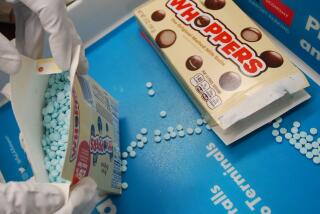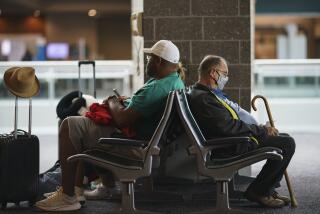U.S. Eases Rules for Liquids, Gels in Carry-On Bags
- Share via
WASHINGTON — The Transportation Security Administration is easing restrictions on bringing liquids, aerosols and gels aboard airplanes, officials said Monday, as long as they are purchased from shops past airport security checkpoints or are in small containers.
TSA chief Kip Hawley, speaking at a news conference at Ronald Reagan Washington National Airport, called the changes a common-sense approach which will “keep us at a high level of security but make it a little bit easier for passengers.”
Under the new rules, which take effect today, carry-on toiletries such as shampoo and hand lotion are limited to 3-ounce containers and must all be placed in a one-quart zip-top clear plastic bag for screening. Since early August, such items were confiscated by screeners unless packed in checked luggage.
Passengers also will be allowed to carry aboard previously banned items, including coffee and water, if they are purchased in secure areas of the airport.
Severe restrictions on carry-on items were imposed Aug. 10 after British authorities announced they had arrested a group of suspected terrorists who were plotting to blow up U.S.-bound flights with liquid explosives.
“We now know enough to say that a total ban is no longer needed from a security point of view,” Hawley said, citing explosives experiments by the FBI and other laboratories.
The Canadian government announced similar revisions that also took effect today. European countries are considering changes in their policies, according to officials at the Department of Homeland Security.
The announcement marks the second time the TSA has tweaked the regulations. The first change, made three days after the ban was imposed, allowed passengers to carry up to 5 ounces of glucose gel or other blood-sugar treatments, up to 4 ounces of “essential” liquid nonprescription medications, small amounts of baby formula or breast milk if traveling with an infant, and solid lipsticks.
Airline industry representatives and passenger advocacy groups reacted favorably to the announcement.
James C. May, president and chief executive of the Air Transport Assn. of America Inc., a trade group that represents U.S. airlines, said in a statement that his organization supported the “refinement of banned items ... because of TSA’s security assessment and because it will reduce passenger inconvenience.”
Caleb Tiller, a spokesman for the Virginia-based National Business Travel Assn., said business travelers would be pleased by the changes. Although business travelers tend to adapt to changing travel regulations more quickly than leisure travelers, he said, many felt inconvenienced by the carry-on restrictions.
“It has caused some frustration for business travelers who typically, especially on short trips, would not want to check bags,” Tiller said. “If the ban stayed in place long-term, it could have a negative impact on travel.”
The association, which represents 2,700 corporate travel managers, had been urging Homeland Security to ease the restrictions, he said.
“Anything that makes it easier for business travelers to go about doing their business is applauded,” said Paul Burnham Finney, a contributing editor at Frequent Flyer magazine, adding that women were more likely to be cheering the changes than men.
“You’d be pretty accurate in guessing that women are overjoyed,” he said. “They can carry the gels and the blush and the this-and-that.”
Elizabeth L. Blanton, 35, assistant professor of astronomy at Boston University, said that when she traveled to Germany for a conference last month, airline security confiscated her pricey Chanel cosmetics.
“I always have liquid makeup, like lip gloss or concealer,” Blanton said. “And I always have water. That was a pain that you couldn’t bring water, even if it was unopened water. They’d just say, ‘Drink up.’ ”
Rebecca Chapa, 34, of San Francisco flies cross-country as a saleswoman for Rubicon Estate Winery.
The regulations have made flying more of a hassle, she said. And, she added, they were confusing. On one trip, she said, her nail polish was confiscated, but not the lip gloss or perfume she had accidentally packed in her carry-on.
The TSA’s Hawley said the new rules could reduce the amount of checked baggage, which he said increased 20% after the ban on carry-on items was imposed. Since then, passengers have had long delays while checking luggage and at baggage carousels while picking it up.
Despite easing the carry-on regulations, the government is keeping the threat level for domestic and international flights at “orange,” indicating a high risk of terrorist attack, said Michael P. Jackson, deputy secretary of Homeland Security. “We don’t anticipate changing that overall aviation threat level anytime in the near future,” he said.
One former Homeland Security official questioned the rationale for the changes.
“I think TSA bowed to pressure from the public and industry,” said Clark Kent Ervin, the department’s former inspector general. “Either harmless liquids and gels can be [used] to make a bomb or they can’t be. If they can be, and we still have no defenses against it, it is as dangerous to let them onto airplanes as it is to let prefabricated bombs.”
*
kimi.yoshino@latimes.com
Mohammed reported from Washington and Yoshino from Los Angeles.
*
(BEGIN TEXT OF INFOBOX)
Travel Ban on Liquids Eased
Effective today, the Transportation Security Administration has modified its restrictions on liquids that can be carried aboard airliners departing from the U.S. Changes include:
* Passengers will be permitted to carry aboard travel-size toiletries such as shampoo and toothpaste.
* They must be in containers no larger than 3 ounces and must all fit in a one-quart clear plastic zip-top bag.
* The bag must be X-rayed separately.
* More than 3 ounces of prescription liquid medications, baby formula or glucose gel for diabetics may be carried if declared to security.
* Once through security, travelers will be able to buy items, including beverages, and take them on the plane.
* More details are available at the TSA website: www.tsa.gov
Source: Transportation Security Administration
More to Read
Sign up for Essential California
The most important California stories and recommendations in your inbox every morning.
You may occasionally receive promotional content from the Los Angeles Times.














